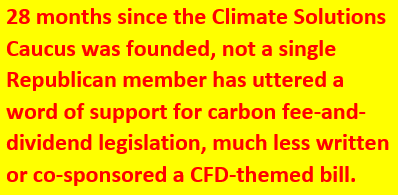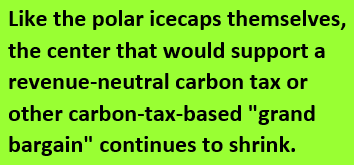Carbon-dividend proponents continue, as ever, to push for national “fee and dividend” legislation. Today the Washington, DC-based Climate Leadership Council announced formation of a lobbying arm, Americans for Carbon Dividends, headlined by former Senate Republican majority leader Trent Lott, former Senator John Breaux (D-LA) and former Federal Reserve chair Janet Yellen. This follows the news last month that the Climate Solutions Caucus — a project spearheaded by the grassroots Citizens Climate Lobby — has enrolled four new Republican House members, bringing total membership to 78 — 39 R’s and 39 Dem’s (with each new Republican, a Democrat is brought in from a waiting list).
If tenacity trumped reality, CLC and CCL would now be refining their fee-and-dividend proposals into Congressional bills and shepherding them through hearings, markup and, ultimately, legislation. Within a decade of enactment, the money-saving and profit-driven replacement of carbon-belching coal, petroleum and natural gas by low- and zero-carbon fuels, technologies and cultural norms would have pushed U.S. carbon emissions 27 percent below current levels and 36 percent below 2005, the standard baseline year in climate analysis, easily fulfilling our country’s Paris climate pledge. (Figures are based on our modeling of U.S. energy, assuming CLC’s recommended starting CO2 price of $40 per ton, followed by annual rate increases of $5/ton; details here.)

So much for the premise of bipartisanship built into the political strategy for carbon fee-and-dividend.
Alas, reality doesn’t bend so easily. Especially when it comes in the guise of a Congress ruled by, as it is often said, Earth’s only major political party (among democratically run countries) that has sworn itself to disbelieve in human-caused climate change and to disavow the necessity or possibility of public policy to combat it. At this writing, 17 months into the Trump administration and 28 months since the Climate Solutions Caucus was founded, not a single Republican member has uttered a word of support for carbon fee-and-dividend legislation, much less written or co-sponsored a CFD-themed bill — even though, from the outset, the political strategy behind CFD has been built on bipartisanship.
By the same token, the impressive list of Republican luminaries standing with CLC/ACD consists entirely of former office-holders: former Sen. Lott, former Reagan and Bush-41 cabinet secretaries James Baker and George Shultz (the latter’s cabinet service actually extends back to the Nixon presidency), and others whose glittering credentials are shown on the CLC and ACD web sites.
This isn’t meant to disparage these organizations or individuals (excepting current GOP office-holders). We have written glowingly of the fee and dividend concept for a decade, including last year in articles in The Nation and the Washington Spectator. Both pieces praised the Climate Leadership Council’s advocacy, as have our numerous blogs (here, here, and here, inter alia). We were honored to gain George Shultz’s signature on our 2015 Call to Paris Climate Negotiators: Tax Carbon, and are stirred that, in his 98th year, Secretary Shultz continues to devote himself to climate sustainability on behalf of both CLC and Citizens Climate Lobby. We have also worked closely with CCL since its formation in 2009, fielding hundreds of queries from CCL activists on tax incidence, energy modeling and other “technical” matters and gratefully accepting financial contributions from CCL members as well.
So it’s with a measure of sadness that we share here our sense that the time for carbon dividend proposals has probably passed. The center to which Baker-Shultz (CLC) and fee-and-dividend (CCL) were designed to appeal barely exists. It’s not just that no sitting Republican has endorsed Baker-Shultz or indeed fee-and-dividend in any form. It’s also that the Democratic majority that will be needed to pass a carbon tax bill appears unlikely to rally around a revenue-neutral carbon tax, whether it’s organized as fee-and-dividend or some form of tax swap.
To be sure, the Democratic majority’s carbon tax — if and when there is one — may include a degree of “dividending,” but only of a portion of the revenues. That’s because a Democratic carbon tax bill will also insist on directly investing much of the carbon revenues: in renewables, energy-efficiency, mass transit, worker resettlement and retraining, and damage mitigation — rather than relying on the price pull from the tax. (A textbook example of such a “just transition” bill is the state carbon tax proposal developed by NY Renews, the energetic left-leaning grassroots coalition in New York State.)
There’s nothing wrong with that, provided such a carbon tax can pass and that its tax level rises quickly enough over time to overcome the lesser price-sensitivities (“elasticities”) that govern driving, freight, air travel and the like, which make it harder for carbon-pricing to drive down emissions in the economy’s non-electric sectors. But of course a good deal of the intended appeal of carbon dividend plans was that households, with politicians following in their wake, might support raising the carbon tax because the size of their dividend checks would rise in tandem. Diluting the dividends weakens the appeal.
 And revenue-neutrality isn’t the only flashpoint lurking in the CLC-ACD proposal. Another element of the deal — one that has won a measure of oil-industry support — would immunize fossil fuel companies against litigation seeking to hold them accountable for climate damage caused by their products. Earlier today, a leading strategist and backer of such litigation, Lee Wasserman of the Rockefeller Family Fund, told the NY Times that “We categorically oppose any deal that shoves trillions in costs down the throats of innocent taxpayers and lets the companies skip away to profit and deceive another day.”
And revenue-neutrality isn’t the only flashpoint lurking in the CLC-ACD proposal. Another element of the deal — one that has won a measure of oil-industry support — would immunize fossil fuel companies against litigation seeking to hold them accountable for climate damage caused by their products. Earlier today, a leading strategist and backer of such litigation, Lee Wasserman of the Rockefeller Family Fund, told the NY Times that “We categorically oppose any deal that shoves trillions in costs down the throats of innocent taxpayers and lets the companies skip away to profit and deceive another day.”
While sentiments like Wasserman’s help rouse the climate base, they don’t point to a policy solution. Like the polar icecaps themselves, the center that would support a revenue-neutral carbon tax or other carbon-tax-based “grand bargain” continues to shrink. As the horrors of the Trump administration and its Congressional Republican enablers continue to mount, there’s no apparent middle ground, whether in climate and carbon-taxing or in any consequential policy-making.
We can commend the ACD initiative — which former Senators Lott and Breaux have detailed in a New York Times op-ed — while bemoaning its lack of political currency. The political struggle to contain climate change has moved to the courts and to the state and local levels. If and when a semblance of sanity returns to Congress and the White House, that state and local mobilization will be critical to enacting the carbon tax and complementary policies necessary to achieve deep cuts in emissions.
Note: A month after we published this post, Rep. Carlos Curbelo (FL-26), introduced a carbon-tax bill — the first from a Republican member of Congress in a decade — as we reported here.

Kyle Murphy says
This is a great analysis. One wild-card here might be the immense grassroots network that CCL has built in support of their policy. The failure of cap & trade in 08 is in part thought to be due to the lack of enthusiasm from the environmental base. A fee & dividend approach seems like it would have a lot of support from the volunteer/donor/voter wing of climate movement.
peter joseph says
Charles,
I agree with much of what you say, but there’s much you didn’t mention.
Regarding the lawsuits against FF companies for withholding their scientific info, Ted Halstead of the CLC points out that Exxon & Co were not the only parties privy to the information. The government and the science community knew about it too. Where does that leave prosecutors? Oil will fight on First Amendment grounds.
Regarding the inevitable squabble over revenue return, let’s just say everybody is right. Full dividend return is the only mechanism that is clearly equitable and fully accountable, as Sec. Shultz likes to point out. In the face of fierce resistance and propaganda, that transparency will be crucial for long term political support and stability.
Furthermore, there seems to be plenty of money sloshing around in the federal budget for other worthy causes. Does the DoD really need another $50Bn, or could those revenues be put to better use funding the needs of displaced workers, communities, R&D, adaptation, etc?
Enacting CCL’s, CLC’s or ACD’s carbon dividends program will signal that our civilization is finally seriously launching a full frontal assault on this life threatening situation. In that environment, it would make sense for other streams in the federal budget to align in that direction, to the satisfaction of the many hands outstretched for the carbon tax revenues. Meanwhile, these advocacy groups should continue to pitch their “pure” proposals, come what may in the sausage factory.
Charles Komanoff says
Thanks for your comment, Peter.
I share your pessimism re litigating Big Oil for deception and conspiracy, and have said so in previous posts.
But I can’t endorse your larger point that advocates should continue pitching carbon fee-and-dividend, unless we loudly and clearly call out the Climate Solutions Caucus as 99% or more greenwash, and otherwise ensure that none of its three dozen R’s who are running for re-election are able to use CSC to paint themselves as pro-climate.
Drew Keeling says
Thanks, Charles, for another timely and authoritative blog analysis.
“The political struggle to contain climate change has moved to the courts and to the state and local levels,” might well be interpreted as: the populist turn has reduced the chances of national level carbon taxes from low to very low.
The variation of this theme articulated in Justin Gillis’ quote of James Hansen in last weekend’s NY Times (“It’s very hard to see us fixing the climate until we fix our democracy”) might, however, be viewed from a “half-full glass” perspective as:
If we can break the feedback between dysfunctional politics and partisanship run amok, we might make progress on carbon pricing, reduction of greenhouse gases, etc.
Or, looking at a “half empty glass”: Trump has been president for a nearly a year and half and nobody has yet come up with a clearly viable antidote.
The current prospects for effective widespread carbon taxation look indeed as poor as ever. Yet, I cannot help wondering why still more in a long series (see the Progress/Supporters pages of this website) of retired politicians and other public figures, Republicans and Democrats, are stepping forward to endorse some form of revenue neutral carbon pricing. What are they up to?
Might it be that although these retirees are too old for sustained active leadership, they are not too old to perceive that climate change is going to be around for a long time, and that no matter how much or how little progress is made to slow it or adapt to it, that under almost any conceivable economic system a revenue neutral Pigovian tax on carbon in fuels is going to make good sense, and that they want their names recorded on the right side of history?
Maybe someone should interview them and try to find out.